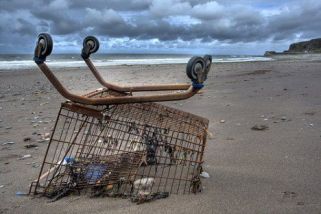 The poet and novelist George Mackay Brown is well-known for his love of place, and for his laments about their destruction with the advent of stuff like concrete, plastic bottles, portable transistor radios, and what he describes as the ‘menace of cars’, indeed with all signs of industrialization.
The poet and novelist George Mackay Brown is well-known for his love of place, and for his laments about their destruction with the advent of stuff like concrete, plastic bottles, portable transistor radios, and what he describes as the ‘menace of cars’, indeed with all signs of industrialization.
In a piece penned for The Orcadian and published on 23 March 1972, he (again) recounts feelings of deep grief about the prevalence of contaminants – oil slicks and junk – that he finds on his sojourns along the coast of his beloved island home. But the piece concludes on a different note:
We must have faith that somewhere, deep down at the very roots and sources of life, there is an endless upsurge of health and renewal. (If there were not, the earth would have shriveled like a rotten apple millenniums since.) A hundred years ago the poet Gerard Manley Hopkins, troubled by the pollution of industrial England, consoled himself with the certainty that ‘there lives the dearest freshness deep down things …’. We can only hope that that primal unsullied source will be strong enough to wash away the frightful poisons that men are pouring into the air and earth and oceans every hour of the day and night. So, nowadays, when I take an afternoon walk around the coast, I am not offended any more by the empty sauce bottles and syrup tins on the rocks below. They seem to be simply human friendly objects. The freshness of nature, that lives ‘deep down things’, passes over them, and they are gone.
Hope is the strangest – and the most unbelievable – protest.
[Image: source]
We can only hope that that primal unsullied source will be strong enough to wash away the frightful poisons that men are pouring into the air and earth and oceans every hour of the day and night.
Actually, I think we can be certain. Come the hell of rising temperatures or the high waters of pervasive flooding due to anthropogenic climate change, the earth will renew itself. The question is whether humans and other still-existing species of flora and fauna will still be here to see/sense it. The “frightful poisons that men are pouring into the air and earth and oceans every hour of the day and night” — ultimately we are committing not geocide suicide.
LikeLiked by 2 people
Sorry, forgot the “but” — the conclusion should read “not geocide but suicide.”
LikeLike
“deep down at the very roots and sources of life, there is an endless upsurge of health and renewal.”
Yes, I agree. Even on a universal level. Eight billion years ago the universe was composed entirely of helium and hydrogen, before the death of the first generation of stars. Nowhere in the universe were there any conditions even remotely capable of supporting life as we know it and there was no good reason to expect those conditions would ever occur.
Likewise the earth for millions of years.
But it seems creation moves toward complexity and life. It is unlikely that human folly could destroy all life on earth, and from whatever remained nature’s patient march would resume. Even if all life were extinguished, the process would continue and reboot.
LikeLike
A bit of a GMB -who I love -romantic fallacy. God is the only hope!
LikeLike